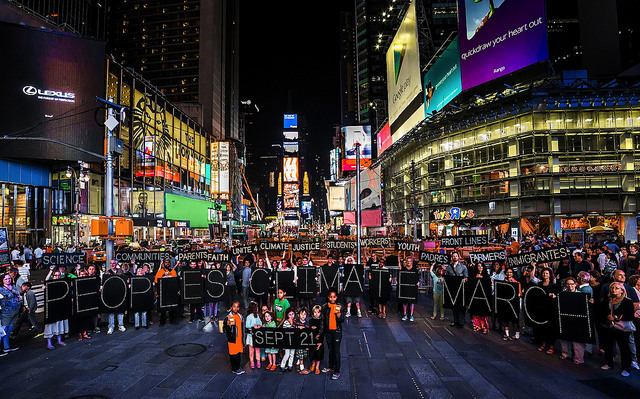I won’t forget the time I was in the same room as Hillary Clinton: I shed so many tears.
It was June 2012, in Rio de Janeiro. I was at the Rio+20 United Nations Conference on Sustainable Development. It was the first time I realized that, contrary to what Canadians are led to believe, our values and best interests are not represented by our government on the international stage.
As a youth delegate to these conferences, I couldn’t bear hearing about some of the actions my government — elected to protect my future — has been taking on behalf of my country. I cried because I heard testimony after testimony from those whose lives are negatively affected by the tar sands, whose lives are directly impacted by the climate change Canada is willingly playing a leadership role in promoting.
It’s easy to go to the pump, to turn on phones and laptops, to use energy without thinking critically about where it comes from. After all, many of us have been to Alberta, but odds are most of us (save for Neil Young) haven’t ventured out to Fort McMurray lately.
So why should we care about what happens here in our cities, there in northern Alberta or elsewhere in the world? The answer lies in acknowledging that we are all inherently connected as members of a global community. We must recognize our need for greater empathy and deeper humanity.
Global warming (and the human burning of fossil fuels that is causing it) is often perceived as an environmental issue. While this is true, it is even more significantly a human issue. Climate change is already affecting so many fellow human beings on this planet — especially fellow Canadians in our own communities.
Members of the Athabasca Chipewyan and Beaver Lake Cree First Nations are no strangers to the impacts of the tar sands — the development of the bitumen is located in their traditional hunting grounds. “What was once the Boreal Forest is now the Sahara Desert,” states Crystal Lameman, in talking about her community’s suffering. She talks about infants needing to be airlifted to hospitals after drinking contaminated water, of needing to limit showers to five minutes, otherwise one’s skin starts to burn.
Moreover, northern communities, such as Iqaluit, have long noticed significant disruption to their subsistence living due to sharp climactic changes occurring in the region. Many are unable to cope with these sudden shifts.
Examples of such communities abound from coast to coast. The fact that we do not hear about them should not affect our ability to discern that climate injustices are taking place. By accepting proposals to ship, transport by rail and build pipelines that will carry tar sands bitumen, cities across the country are complicit in the suffering of Canadians, both in other provinces and in the local communities that will suffer the brunt of inevitable spills and contamination.
Not only do we need more action from our municipal elected representatives, but we deserve so, so much more from our Conservative government. Time and time again, Canada has been singled out at the United Nations climate negotiations as disrupting any type of progress in the international talks.
Many Canadians are already starting to realize this disconnect between our best interests and those of Prime Minister Harper. Why do his goals appear to be more aligned with the Canadian Association of Petroleum Producers than the Athabasca Chipewyan First Nation, the community of Lac Megantic or the residents of Nunavik?
There is a growing number of Canadians who are asking themselves these questions. Many of them are headed to New York on September 21 for the People’s Climate March, an event slated to be the largest climate rally in history.
The March’s goal is simple: UN Secretary General Ban Ki-Moon is organizing a summit of world leaders to address international climate inaction, and ordinary citizens (including young generations like mine) want them to know that we will hold them accountable for their actions. Indeed, Canadians are demanding a better future than the one the Harper government is currently envisioning for us.
We pride ourselves on Canadian values of justice, kindness and equality for all. It’s time our governments did the same.
Leehi Yona of Montreal is a climate justice community organizer. She is studying Biology, Environmental Studies, and Public Policy at Dartmouth College. In 2013, she was named Canada’s Top Environmentalist Under 25.
Photo: flickr/Climate March



